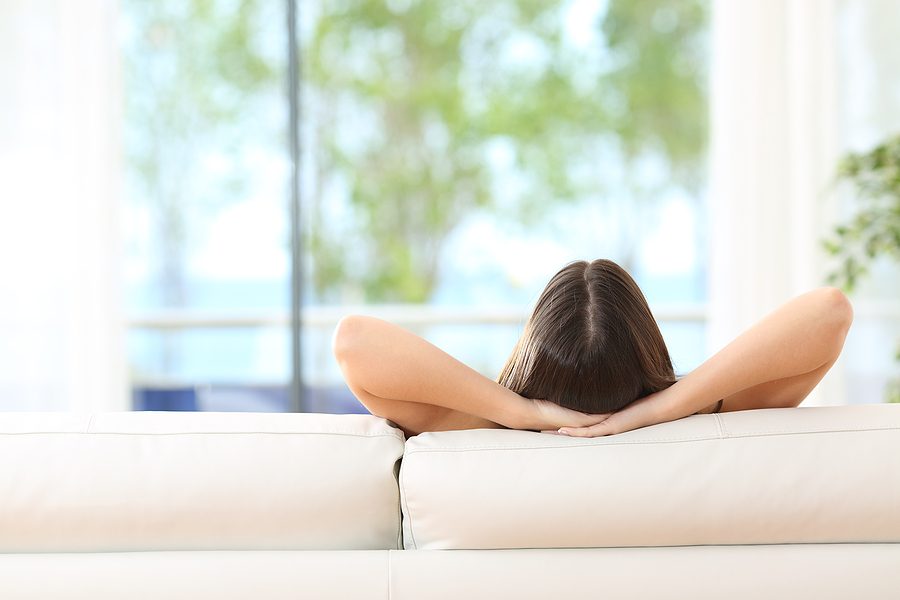Many women operate in an ever-present state of low anxiety or worry, also called generalized anxiety, that may blossom into episodes of full-blown panic attacks, phobia or anxiety disorders during times of psychological stress or biological change — like menopause.
A majority of my patients with chronic anxiety are so accustomed to living with it – often since childhood — that they don’t even mention it until I ask or until they begin perimenopause and their anxiety symptoms worsen.
Anxiety and worry are a complicated knot of emotional and physiological issues. Most psychologists look at anxiety as purely emotional: the outward sign of repressed negative feelings and inner conflict. But over 30 years of scientific research into severe anxiety disorders and panic attacks has established that all anxiety has a real, physiological cause that is just as important to treat — especially for relief of anxiety related to hormonal imbalance.
This is good news. It means that anxiety symptoms that were once dismissed as character flaws (think of the terms “worry wart,” “head case,” and “control freak”) are not feelings you just have to live with or medicate when they become too severe for you to function. There’s a lot more to the story — and a lot that you can do to get that monkey of anxiety off your back.
What is Anxiety?
Everyone experiences anxiety or feels panicky from time to time: the shaky knees and thudding heart, the shortness of breath, and the mind going a million directions all at once. Part of what keeps us alive is our ability to feel fear. In fact, we are made with a kind of built-in alarm system that brings the full weight of our mental and physical prowess to bear in the face of danger — the “fight or flight” response.
The limbic system, the parts of the brain responsible for orchestrating our emotions, including the fight or flight response, relies on a complicated interplay between neurotransmitters and hormones to fuel the body and mind to deal with a perceived enemy.
What’s not natural is to feel afraid and upset most of the time without any tangible cause. Like our immune response, our fight or flight response is meant to click into action in the face of danger and then rest. But in our day and age, too many of us never get to relax: our minds are perpetually on high alert with the accompanying physical response.
Anxiety Overload
It’s no exaggeration to say there is an anxiety epidemic in our country. Over 19 million American adults and millions of children have anxiety disorders ranging from mild to severe. And the statistics only count the people reporting their anxiety symptoms to doctors. I know from my practice that there are many more on the mild to moderate scale who feel reluctant or even ashamed to admit their anxiety.
Our culture tells us that feelings of fear, vulnerability, and even shyness are signs of weakness — which makes anxiety the fault of the victim. Women are taught from childhood to “grin and bear it.” The people who accuse us of medicalizing anxiety are not being helpful. The truth is that telling women to suffer through anxiety is just as terrible as telling them that drugs are the only remedy for anxiety and panic attacks. Neither is correct.
Let’s start by looking at the major types and symptoms of anxiety and then examine the real roots of anxiety. That’s where we’ll find solutions.
Severe Anxiety Disorders
Severe panic and anxiety disorders like obsessive-compulsive disorder (OCD), post-traumatic stress disorder (PTSD), social phobias, and stress disorders affect only a small minority of anxiety sufferers.
Severe anxiety disorders are highly treatable but require medical diagnosis. If you think you may be experiencing any of these disorders, contact your healthcare practitioner right away. Different approaches that include drugs and cognitive-behavioral therapies (such as exposure therapy) are proving to be very successful.
One hot topic of study is the connection between anxiety disorders and genetics, because anxiety disorders clearly run in families. I believe that genes are a factor in some anxiety disorders, but generally not the most important factor. More often than not, anxious women grew up in anxious households. Anxiety is usually a learned behavior that can be unlearned — even when it’s severe. We’ll return to this topic after we explore generalized anxiety disorder, which affects many more women than the severe anxiety disorders.
Generalized Anxiety Disorder (GAD)
Mild to moderate anxiety is far more common but harder to identify than severe anxiety disorder. Called generalized anxiety disorder, or GAD, it’s characterized by compulsive worrying and physical symptoms of anxiety which persist for more than six months. Often these women were anxious — and medicated — as children, suffered some form of childhood trauma, or grew up in anxiety-ridden households.
More often than not, my patients are so used to their anxious feelings that they don’t mention them until I ask. That’s because while anxiety can be debilitating — and may grow increasingly so if left untreated — symptoms of mild to moderate anxiety may not obviously impact your ability to function.
In fact, quite the opposite may seem to be true. Often it is the high-achieving, seemingly “together” woman who finds it difficult to admit she has chronic anxiety. And frequently I see dynamic, non-stop women who rarely felt anxious in their younger lives get slammed with anxiety and panic attacks as they enter perimenopause.
These signs of anxiety can be misread at the doctor’s office precisely because these women appear to be such powerhouses. So let’s find out what the symptoms of anxiety really are.
Symptoms of Anxiety and Panic Attacks
While most of us will experience episodes in which we feel some or all of these symptoms, what differentiates healthy anxiety and/or panic from chronic anxiety and panic attacks is the trigger. If you think you hear a strange sound in the night, it’s natural to wake up with a start, your heart pounding and your muscles seizing. But it’s unhealthy to have these symptoms while sitting at a table in a restaurant.
One of my patients describes her chronic anxiety as a kind of internal grinding — an all-consuming revving up of energy that then has nowhere to go. Other symptoms of generalized anxiety and panic attacks include:
- Irrational fear or dread
- Muscle tension and headache
- Chest pain
- Elevated heart rate/palpitations
- Insomnia
- Diarrhea/GI distress/IBS
- Nausea
- A feeling of fullness or chest pressure/shortness of breath
- Jumpiness/irritability/shakiness
- Sudden changes in body temperature/hot flashes
- Tearfulness
- Depression — about 20-30% of people with anxiety disorders also suffer from depression.
Usually what you don’t feel when you’re anxious is tired or hungry — until you eventually crash, feel more tired than ever, and then crave sugar to restore your mood.
How Does a Normal Anxious Feeling Become Chronic Anxiety?
As we’ve said, anxiety is a knot of emotions and physiology. The root cause of the anxiety could arise on the emotional side or the physical side — or both. The feeling of anxiety always begins with a trigger that initiates a survival response from the limbic system. At the first whiff of apparent danger, your brain chemistry, blood hormones and cellular metabolism all whirl into action.
When you have chronic anxiety, this response may lessen but it never gets turned off, even when there’s no palpable threat. Over time your anxiety symptoms may be triggered by less and less serious events because your limbic system has been sensitized to react in a highly anxious way.
For example, if you were constantly yelled at as a child, you may feel anxious later in life whenever there is potential for confrontation with an authority figure — and you may go to extremes to avoid that confrontation, even in a situation as seemingly benign as returning an article of clothing that doesn’t fit. By this point your conscious mind has lost track of the link between your current feeling and your past emotional experience; you no longer have any idea why you’re anxious about something that shouldn’t be a source of anxiety.
The problem with anxiety is that it becomes so easily entrenched — it becomes your normal state. The links among your neurotransmitters, hormones and metabolism become tuned to an equilibrium in which anxiety is maintained. That’s why anxiety relief is all about changing the physical and emotional causes of your anxiety and creating a new, healthier equilibrium. But first let’s explore more deeply what causes anxiety.
Anxiety and Emotional Experience
Early emotional experience is the wellspring for anxiety. The experience may be a major childhood trauma (the death of a parent, divorce, child abuse or sexual abuse, etc.), emotional abuse (constant criticism, abandonment, deprivation), or emotional patterning (anxious parent, alcoholic parent). These adverse emotional experiences can set up a pattern of chronic anxiety.
Anxiety Often Begins in Childhood
Childhood is a time of little power and control. When terrible things happen to us as children, our coping mechanisms are not up to the task. We are unable to process what’s happened and move on in a healthy way. In a very real sense, that adverse childhood experience is trapped inside us. In adulthood, those hidden issues often surface as anxiety symptoms. It may be difficult to connect what is triggering your anxiety to what came before — but there is always a link.
I think of one patient who had very controlling parents. She was charming, bubbly, warm and gregarious (the way her parents wanted her to be) — and exceedingly anxious all the time. Even as an adult she was still performing for others — not living her own life at all — and had little knowledge of what was wrong except for a feeling that she was a fraud. She married a very controlling man (continuing the pattern) and developed a compulsive eating disorder which caused rectal bleeding and other problems.
Her tests showed that her adrenals were exhausted, her serotonin was extremely low and the foods she was eating were throwing her digestive and limbic system completely out of balance. Once she began to support her neurotransmitters through diet and nutritional supplements she had the strength to begin therapy. Through the “talking cure” she was able to find her own power within the balance of her family. Her gastrointestinal problems went away, her anxiety and compulsive eating lessened and she had the physical health to back up her newfound mental strength — all without using anxiety medication.
Dealing with the Emotional Roots of Anxiety
In my experience, you can’t wrangle with anxiety unless you are willing to approach it from many sides. This can take some work — something conventional doctors tend to stay clear of. Antidepressants are given out like candy to anxiety patients to calm their physical symptoms, but in order to find complete anxiety relief — no matter what kind of anxiety symptoms you’re feeling — you must deal with the emotional piece.
Read more articles about how emotions can play a role in our section, Emotions, Anxiety and Mood.
The Physical Factors Behind Anxiety
Women have been taught for so long that anxiety is all in their heads that I’d like to spend a few moments talking about how anxiety is everywhere — in your brain, your pituitary gland, your adrenals, your GI system, your heart, and your ovaries too! And of course, they’re all interrelated.
Neurotransmitters and anxiety
A neurotransmitter imbalance can sensitize your brain to a fear response. Consistently high levels of excitatory neurotransmitters (norepinephrine, epinephrine and dopamine) and correspondingly low levels of the calming, inhibitory neurotransmitters (serotonin and gamma-aminobutyric acid, or GABA) actually modify your brain chemistry. In my practice, I run a neurotransmitter test on every patient with symptoms of anxiety. The test is controversial but very useful in the hands of an experienced professional.
Caffeine affects brain chemistry by raising levels of dopamine; in sufficient amounts coffee and other caffeine-laden drinks can bring on panic attack symptoms. The jitteriness you feel from a shot of espresso comes from elevated dopamine. The neurotransmitter imbalances that cause anxiety are related to those in children with ADHD and ADD (conditions also associated with high dopamine); in fact, what may look like ADD in some children may actually be related to severe anxiety. The symptoms can be very similar. Read more about caffeine in our Detoxification section.
Popular anti-anxiety medications like BuSpar, Ativan, Valium, and Xanax work on these neurotransmitters. Alcohol works in the same manner by raising levels of GABA. That’s why having a drink helps you overcome your social discomfort and unwind, while more than a few causes slurred speech, slow reflexes, and a decrease in cognitive ability.
The fear–anxiety neural pathway is very easily influenced. This means that anti-anxiety medications (particularly benzodiazepines), caffeine, and alcohol are highly addictive. It makes sense that people who inherit or develop anxiety-sensitive brains also have a higher risk for addiction.
The HPA Axis and Anxiety
Along with your neurotransmitters, your hormones play a crucial role in mediating anxiety. The hypothalamic–pituitary–adrenal (HPA) axis is the hormonal system that influences mood. Imbalances along this system can bring on panic attacks and chronic anxiety.
As part of the cascade of hormones in the fight-or-flight response, your hypothalamus releases a hormone called corticotropin–releasing factor (CRF), which jolts you into action. CRF flows through your pituitary gland, where it stimulates adrenocorticotropic hormone (ACTH), which in turn tells your adrenal glands to release cortisol. Cortisol opens the gates for a rush of glucose, fat, and protein to give your cells the energy and alertness they need.
In a healthy system, the hormonal flood recedes once the threat is disabled. But different factors can disrupt this pathway, causing the gates to stay open and running the adrenals to exhaustion. Levels of ACTH and cortisol stay elevated, causing anxiety, weight gain, accelerated aging, and metabolic imbalances.
CRF also seems to be a factor in anxiety. People with high anxiety generally have high levels of CRF — which indicates that the HPA axis is always on. Researchers think that early emotional trauma may trigger elevated levels of CRF, which the body then maintains through adulthood.
Estrogen, Menopause and Anxiety
Clearly, sex hormones like estrogen play a critical role in anxiety. Women are more than twice as likely as men to feel anxiety, especially during the hormonal ups and downs of PMS, perimenopause, and menopause. Anxiety is often the first sign of perimenopause. And if women have tried Hormone Replacement Therapy (HRT) to manage symptoms, they often experience rampant anxiety symptoms when they start to wean themselves off the HRT. For more information on HRT, please refer to our section, Bioidenticals and HRT.
One study showed that anxious women are more likely to suffer uncomfortable hot flashes during perimenopause. In another study, baby rats of both sexes were deprived of maternal attention at birth. When they grew up, the female rats showed measurable signs of anxiety and stress when tested in a maze; the male rats did not.
Estrogen is almost certainly tied in to serotonin levels — as any woman who’s ever suffered a mood swing with their monthly cycle can attest. What you know instinctively, science is beginning to prove. It may be that estrogen has a soothing, calming effect on your system similar to or interdependent with serotonin — when levels fall so do our moods and energy levels. Estrogen and progesterone levels are directly influenced by the adrenals and cortisol overproduction.
But in my experience, menopause doesn’t actually cause anxiety — it simply amplifies what was already there. That’s why relief from menopausal anxiety and panic attacks is found only after restoring hormonal balance.
Digestion and Anxiety
Sue came to me with digestive and bowel problems. She was in a very high-profile marriage, the mother of three kids, and — on the surface — a total go-getter. She eventually told me that her anxiety was so severe that she was on five different psychotropic drugs. She felt she had never been able to “do life.”
After a lengthy discussion, Sue went into therapy and began a course of treatment that included weaning slowly off her medication and supporting her system with supplements and good nutrition. She began to exercise regularly and examine some of the stress in her life. Little by little her anxiety decreased and then disappeared — and so did her bowel problems.
Most of the chronically anxious patients I see have some form of GI problem, whether it’s nervous stomach, IBS, diarrhea, nausea, bloating or bleeding — anxiety seems to take its first foothold in the gut. And if your GI tract is upset, it is almost impossible to feel well — which can add to the anxiety!
For more information, please read our articles in our Digestive Health section and click here to see the products for digestion that marcellepick.com has formulated to assist you in your well being.
Nutrition, Food Sensitivities and Anxiety
In some people, food allergies and food sensitivities trigger anxiety symptoms, much like dust triggers an asthma attack. Your nutrition heavily influences your mood. And the gut is a source of serotonin, the major mood hormone. As I said above, your digestive system is intricately tied into your hormonal balance, your brain chemistry, and your moods.
Dr. Abraham Hoffer, a pioneer in the connection between nutrition and mental disorders, discovered in 1960 the link between a niacin deficiency and the improper conversion of adrenaline in the brain that leads to psychosis. If administered early in a diagnosis, Dr. Hoffer found that over 90% of his mentally ill patients were effectively treated with nutrition therapy. There are many similar links between nutrition and neurotransmitters.
The Pfeiffer Treatment Center has had enormous success treating adults and children with anxiety through nutrient therapy. A great deal of research is underway examining the connection between essential fatty acids and inflammation, which includes brain and gut inflammation that relates to anxiety disorders. I recommend that everyone include these important acids in their daily routine.
Marcellepick.com offers high-quality, pharmaceutical grade supplements to enhance your health.
The Risks and Benefits of Anti-Anxiety Medications (Anxiolytics)
Medication is being prescribed with abandon for anxiety. Scared of flying? Take a Xanax. Can’t sleep? Take an Ambien. Shy at parties? Try a BuSpar.
While I am very much in favor of using a limited course of medication to help cope with severe physical symptoms of anxiety, I am really concerned about the widespread use of medication for generalized anxiety.
Anti-anxiety medications are particularly habit-forming and they do nothing to reboot the neural and hormonal pathways for long-term mental health — they simply disrupt the pathway and mask the symptoms of anxiety so you can function.
While this can be a good tool in the short term while you work on your nutritional and emotional fundamentals, anxiolytics are not a smart solution for the long haul. Moreover, in many cases of menopause-related anxiety, anti-anxiety meds like Xanax and Ativan can actually make your symptoms worse. At some point, as a culture and as individuals, we have to stop taking pills and start looking at the root of our problems.
I occasionally prescribe anti-anxiety medicine for generalized anxiety for my patients who feel completely paralyzed by their symptoms. For them, a brief course of drugs helps calm their neurotransmitters, enabling them to function enough to begin making better lifestyle and diet choices, enter into therapy, and follow a supplement and exercise regime. However, I constantly monitor their progress and when we agree they are ready, they stop the anxiolytics, usually with great success.
If you are currently on anti-anxiety medication, do not stop without supervision from a medical professional. However, you can explore other options to support your body and rebalance your system naturally so that when you do stop your medication you won’t suffer a recurrence of your anxiety.
Anxiety Relief: Natural Treatments for Anxiety
Relief from chronic anxiety comes from restoring your body’s natural, healthy equilibrium. You can do that through change in a number of factors: lifestyle, diet, allergies, exercise levels, hormonal balance, general physical health, and your emotional history.
At our practice, we treat anxiety with nutrition and nutritional supplements, some prescription medications, emotional work and bodywork. Let’s review these methods for anxiety relief in detail.
Nutrition Support
- Good nutrition is the foundation of natural treatment for anxiety. If you are serotonin-deficient you will crave sugar and simple carbohydrates. But those foods cause your insulin levels to spike and crash, further destabilizing your mood and creating that “bottoming out” feeling. Eat real whole foods; organic when possible, that will help maintain stable blood sugar levels. Avoid all processed, artificial products, trans fats, artificial additives, simple sugars and carbohydrates (or “white” food). Add multiple servings of fiber-rich vegetables or fruit to every meal and drink plenty of filtered water.
- Take a medical-grade nutritional supplement to fill in any nutritional gaps. A daily supplement that includes necessary fatty acids is an important part of supporting natural neurotransmitter balance and general good health.
Natural Supports for Your Body
- Physical activity is the single best anxiety medication I know. It’s essential to hormonal balance. In one study, people who engaged in 30–60 minutes of moderate exercise every day reported less anxiety than a similar group on anti-anxiety meds who did not exercise. Start slow and build up to at least 30 minutes a day. Find a friend or a neighborhood group to exercise with — it’s more fun and you’ll be more likely to stick with it.
- Get enough sunlight and fresh air. Fifteen minutes of sun exposure (without sunscreen) in the early morning and late afternoon stimulates the production of vitamin D in your body. Vitamin D deficiency is related to depression, SAD, and other mood disorders. Deep breathing helps calm the senses and relax the mind — so combine both!
- Get enough sleep. Adequate sleep is paramount to brain health. Women should get 7–9 hours a night. If you have trouble sleeping, avoid all caffeine (including chocolate and green tea) and set a bedtime that you can stick to. Practice a calming technique like meditation or deep breathing before bed.
Therapy and Alternative Treatments
- If you can afford it, find a counselor to talk to about your emotional experience. Ask for a referral from a doctor, family member or friend. The local Y, religious institution, or grief counseling center may have a list of therapists they can offer. Interview several to make sure you find someone you really like and trust. Many of our patients have had life-changing experiences enrolling in the Hoffman Quadrinity Process, which helps individuals “unlearn” negative emotional patterns.
- Try using the Emotional Freedom Techniques, widely known as EFT. My patients report great success with EFT. I like it because unlike conventional relaxation methods, EFT gets at the root causes of anxiety rather than masking them.
- Investigate integrative manual therapy (IMT). Using gentle applied pressure, IMT opens up blocked energy channels to help the body do what it does best — heal itself. Anxiety is, in a sense, blocked energy, and bodywork helps redirect that energy constructively.
Tests and Assessments
- Take our Hormonal Imbalance Quiz (it’s free). It will help you understand if your anxiety is actually a symptom of perimenopause or menopause. Using progesterone cream or bioidentical HRT may be a useful way to rebalance your hormones and soothe your anxiety.
- Talk to your doctor about taking a neurotransmitter test and discuss the results. Ask to see the results for yourself. Examine your diet for potential food allergies or sensitivities. If you are experiencing anxiety-related gastrointestinal problems, you may want to follow an elimination diet.
Short Term Medication
If you are paralyzed by catastrophic thoughts and debilitating physical symptoms of anxiety, talk to your healthcare professional about the usefulness of short-term medication. If your doctor does not offer additional support techniques to help you in the long term, look around for an alternative or integrative medical practitioner. Long-term use of anti-anxiety medication will not cure you.
Bringing It All Together
It’s my hope that some of this advice will help you get a handle on your feelings of anxiety before they manifest into health concerns. If you are already in the grips of chronic anxiety, don’t worry! By supporting your body, examining your past, and rebalancing your body and mind, your anxiety will get better.
Just imagine how powerful you could feel if all that energy that is consumed by anxiety and fear were unleashed in a life-affirming, positive way! As my friend’s mother once said, “Life demands a warrior, not a worrier.” I know that may be easier said than done, but today is a perfect time to try.







